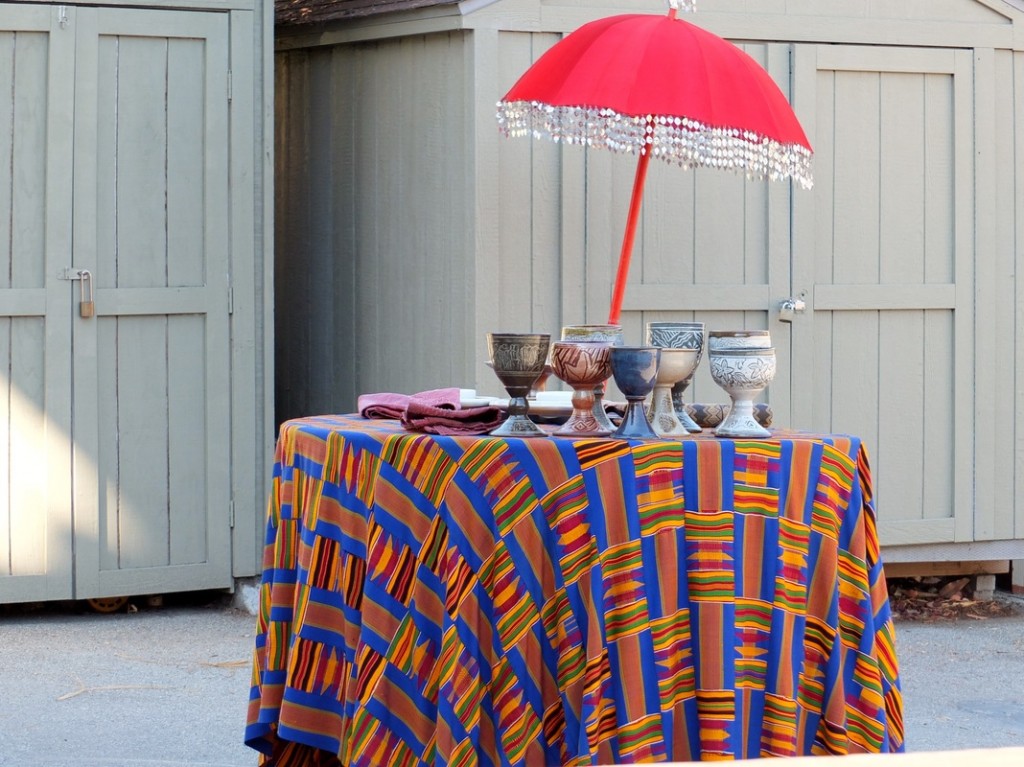
Martin Elfert, Cafe Contributing Editor
Famous – at least within church circles – San Francisco’s St. Gregory of Nyssa Episcopal Church welcomes thousands of people a year who are drawn to its liturgical and musical experimentation and to its food pantry. I spoke with three of its leaders about what it’s like to serve a parish that challenges and inspires so many people. Paul Fromberg is St. Gregory’s Rector, Sylvia Millier-Mutia is its Assistant Rector, and Sara Miles is its Director of Ministry and a well-known author.
Martin Elfert: Are there good things about the way that St. Gregory’s is perceived in the wider church? And are there downsides? In one of your books, Sara, you wrote about a visitor telling you that “We could never do what you do at St. Gregory’s.”
Sara Miles: Well, they never could do what we do – or they shouldn’t. They should do what they can do. If you look at St. Gregory’s as if it’s a template to copy, you wind up with something that’s as inauthentic as if you’re looking at a little village church in England and trying to copy that in downtown Memphis.
Sylvia Miller-Mutia: I think it’s also true, though, that it can be a gift to people who have the luxury of visiting St. Gregory’s. Sometimes if you experience something that you either didn’t believe was possible or it just never even occurred to you, that can open you up to imagine something new. Not to replicate what we do, but to say, “Whoa! If that’s possible, what else might be possible?”
Paul Fromberg: I wonder if the issue is that people fundamentally don’t want the church to change, so having “inspirational others” who are doing the work kind of lets you off the hook. That sounds harsher than I mean it to sound. The question is, “What do you want to accomplish in church?” Do you want to preserve practices that you don’t necessarily believe in? Or do you want to do something real, which may turn things around in a way that is uncomfortable?
Elfert: Every time that I reread “Letter from a Birmingham Jail,” I am startled anew to realize that Dr. King is trying to precipitate a crisis, that – and I’m paraphrasing broadly – he thinks that a crisis is generative. Notwithstanding how famous that letter is, that isn’t an argument that you actually hear often.
Miles: No, because you’re supposed to be in the business of conserving things.
Fromberg: In fact, the 1979 revision of the Book of Common Prayer is built on basically the same assumption as “Letter from a Birmingham Jail,” which is that the institution has to radically change the way that it conceives of itself, the way that it does business. The 1979 BCP is intentionally destabilizing to the received understanding of what church is. That’s getting to be an old document, but people are still confused by its imperative. Doing what you want to do is hard. Actually doing church on the basis of pleasure as opposed to – what is the other reason for doing church? [Laughter.] Obedience or duty?
Miller-Mutia: As opposed to delight.
Miles: It’s also the idea of, “What is church supposed to do for individuals?” Are we going to church to change, to be transformed? Or are you going to be told that things are fine the way that they are? My experience is that most people don’t come to church because their lives are together. Church can really honor, really help with that desire to be changed, to be transformed – which we all have and which we all don’t want.
Miller-Mutia: St. Gregory’s strives for risk-taking that isn’t rooted in trendiness but which is rooted in faithfulness. A desire to do something and to discover, even if it fails miserably, that it’s still part of God’s new creation. I’ve been the beneficiary of that generosity. I’m always astonished that Paul doesn’t shut down new ideas, that he doesn’t shut down my ideas, that he doesn’t say, “We have a reputation to uphold.” Except that the reputation that we have to uphold is one of being willing to take risks.
Fromberg: That necessarily means that we’re going to fail at what we do. That’s only as bad as it feels – and feelings are kind of stupid when it comes to leadership. You can make stupendous mistakes, and they’re not mistakes, they are only things that don’t work. If you only do things that work then you’re dead. It’s not a way to be if you’re preaching resurrection.
Miller-Mutia: That’s what animates our parishioners. We believe that a desire and passion to do something is what qualifies you to do it. And if no one is passionate about something that may help us discern that we don’t need to do that right now. That means that there isn’t a lot of energy going into maintaining things that God isn’t calling anyone to do.
Elfert: How delightful – and how nerve-wracking!
Miles: Having things be uncomfortable puts you in actual touch with, “Where is our safety” and “Where is our hope?” To be able to communicate to the people we’re worshiping with that our safety is in God, not in having the same piece of music every single Sunday; it’s nerve-wracking but it’s also incredibly freeing.
Elfert: There is something good and generative about being a little uncomfortable sometimes.
Miles: That’s heavenly comfort!
Elfert: Most of us do our best work when we’re relaxed – but I’m not sure how many of us have figured out how to get to that relaxed place consistently and on purpose.
Fromberg: My personal trainer always encouraged me to have soft knees, not to stand rigidly, so there’s a relaxed posture but there is also a strong energy. In innovation, you need to know where your strength is. If you’re not strong in your core, then you can’t afford to be relaxed anywhere else. That was almost a sports metaphor!
Miles: We did an outdoor procession for St. Francis’ Day. It was a completely beautiful sunny day, and there was a crowd of people and animals. And Paul was presiding, standing at the table, and he was about to do the Prayer of St. Francis. And he totally freezes and forgets. And yet with the core strength of knowing what he was doing and what it was about, he called out, “Lord, make us instruments…” And then the people gave him the next line. The congregation crowd-sourced the entire prayer. It was beautiful. Paul could have treated it like a mistake, like something shameful. Instead, it was this incredible collective prayer.
Fromberg: That’s an example of the rule of life that we stole from Nadia Bolz-Weber: We’re anti-excellence and pro-participation.
Miles: Except that I think that there is an excellence. We have 52-page script that we study so that we don’t have to use it. We steep ourselves in it so that we understand not just what we’re doing but why we’re doing it.
Miller-Mutia: That “why” is not just the secret gnosis of the clergy and staff. We want that to belong to everyone.
To see images from the St Francis Day event mentioned in the article can be seen here

